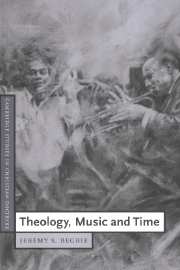1 - Practising music
Published online by Cambridge University Press: 05 June 2012
Summary
Any theologian who wants to learn from the world of music is going to have to ask some basic questions about what this remarkable practice we call ‘music’ actually is. And if there is one thing we should stress from the start it is just that, that when we speak of music we speak of a practice or, better, a multiplicity of practices.
We can keep the principal practices in mind as we proceed, even if their edges are unclear and they often overlap. At the most basic level, there are two interlocking and mutually informative procedures: those which engender music – music-making, and those of perception – music-hearing, and under ‘hearing’ I mean to include all the faculties associated with musical reception, not only the ears. We may speak of music-making as the intentional bringing into being of temporally organised patterns of pitched sounds. For these sound-patterns to be called music, clearly, someone must be able to hear them not just as patterns of sounds but as patterns of ‘tones’ to which the term ‘music’ can be appropriately applied: ‘A person is making music when he intentionally produces certain sounds which he believes could be heard as music by some (extant) persons.’
- Type
- Chapter
- Information
- Theology, Music and Time , pp. 9 - 28Publisher: Cambridge University PressPrint publication year: 2000



